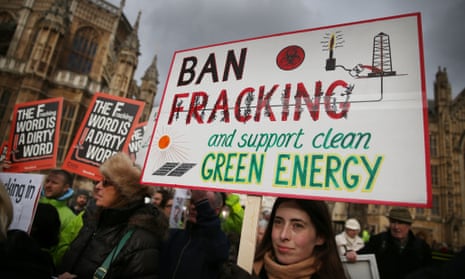David Cameron has rejected calls for a moratorium on fracking from senior MPs, including his former environment secretary Caroline Spelman, saying the US shale gas revolution can be repeated in the UK.
The prime minister’s renewed backing for increasingly controversial shale gas exploration comes at the start of a pivotal week for the industry, with key votes by parliament on Monday and Lancashire County Council from Wednesday.
Monday also saw the revelation in the Guardian of George Osborne’s instructions to cabinet minister to make “personal priorities” of dozens of interventions to fast-track fracking, including the delivery of numerous “asks” from shale gas company Cuadrilla.
“I want to see unconventional [shale] gas properly exploited in our country,” said Cameron, during a visit to Hampshire on Monday. “I think there are good reasons for doing this. We want to have greater energy security, we want to keep prices down, we also want to tackle climate change.”
“The most important thing that needs to happen is for some exploratory wells to be dug and all would see local communities are benefiting from it,” added Cameron, who has previously said the government is “going all out” for fracking. “I think it’s only then that we will see that people in this country see that it works in America and it can work here.”
Opponents of fracking argue that high-pressure fracturing of rocks to release gas risks health and environmental impacts and will undermine the country’s climate change goals. Lord Nicholas Stern has dismissed the idea that fracking will cut UK gas prices as baseless.
Hundreds of protesters gathered outside parliament on Monday to oppose law changes aimed at easing fracking, such as removing the right of homeowners to object to fracking under their properties. John Ashton, until recently one of the government’s top climate change diplomats, told the crowd that the government-industry fracking drive was not just an attack on the environment but also on democracy.
'Stop the infrastructure bill': ex-FCO diplomat John Ashton rallies hundreds opposing fracking #banfracking pic.twitter.com/82Qt1DZxIq
— Guy Shrubsole (@guyshrubsole) January 26, 2015
The environment audit committee report published on Monday calls for a temporary ban on shale gas exploration on the grounds that it is “inconsistent” with the UK’s stated climate change targets. The EAC report also concluded that, by the time any fracking industry was able to produce significant gas, legal limits on carbon emission would be too strict for it to be burned and that “an extensive range of uncertainties” remained over water and air pollution risk.
The Labour party will also force a commons vote on a ban on Monday unless 13 regulatory issues it sees as loopholes are closed, including fracking in nature reserves and drinking water catchment areas.
The EAC’s call for a fracking ban has split academic experts, with some seeing its report as showing “refreshing integrity” while others dismissed is as “ill-informed”.
“Shale hydrocarbons are becoming a textbook example of how to develop England backwards,” said geologist and carbon-capture-and-storage expert Prof Stuart Haszeldine, at the University of Edinburgh. “The government has imposed development from the top, to help companies, against the wishes of residents, and whilst unresolved conflicts and uncertainty remain with scientific and health evidence. Even though it’s possible that drilling, fracking, production, and borehole sealing can be achieved safely, residents need to feel included, not excluded.”
“Public trust in regulations is absolutely essential if shale is to play any significant role in the UK,” said Prof Jim Watson, at the UK Energy Research Centre and who has previously warned against fracking hype. “This may not require a blanket moratorium, but it may mean delays to licensed shale gas activities to allow such monitoring to be carried out.”
Prof Paul Ekins, at University College London and whose work recently showed three-quarters of existing fossil fuel reserves are unburnable if climate change is to be tackled, said he supported a moratorium until it was clear fracking was consistent with carbon emission targets and environmental protection. The should be clear policy ensuring the gas replaced more polluting coal and confidence that leaks of methane, a potent greenhouse gas, could be stopped.
However, the proposed moratorium was opposed by Prof Michael Bradshaw, at Warwick Business School: “It will do nothing to resolve the current stalemate over the question of developing the UK’s shale gas potential. What is required is a precautionary approach that judges each drilling application on its merits and monitors its impact, which, in time, will result in a much more informed debate than we currently have.”
He said: “The real problem is that David Cameron’s statement that: ‘This government is going all out for shale’ appears to have thrown caution to the wind.”
“All fossil fuel production involves risk to the environment, and that is managed,” said Prof David Manning, president of the Geological Society of London. But he said large shale gas production would need carbon capture and storage technology to be rolled out to bury climate-warming emissions.
Quentin Fisher, professor of petroleum geoengineering at the University of Leeds, said: “It is disappointing to see [the EAC] putting the ill-informed views of anti-fracking groups ahead of evidence-based scientific studies. In particular, the report totally overstates the dangers of shale gas extraction such as groundwater pollution, health risk and geological integrity.”
But Prof Kevin Anderson, a climate change expert at the University of Manchester, said: “Numerous reports have conveniently sidestepped how the UK government’s enthusiasm for shale gas is incompatible with its international commitments on avoiding “dangerous climate change”. It is therefore refreshing to witness the integrity of the EAC in putting science and maths ahead of short-term political goals.”

Comments (…)
Sign in or create your Guardian account to join the discussion